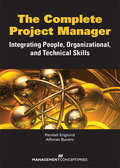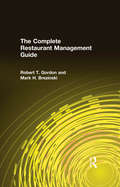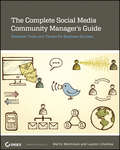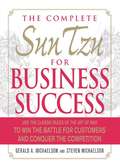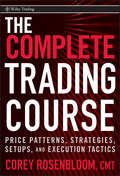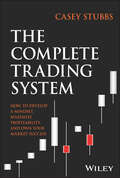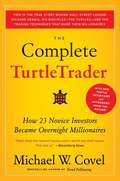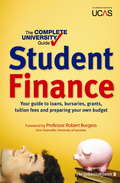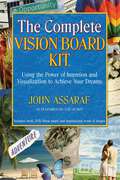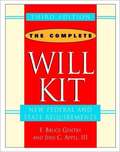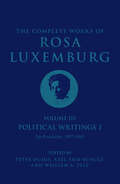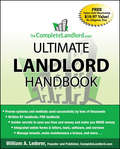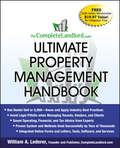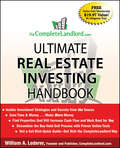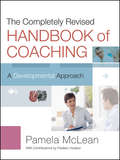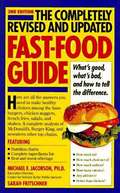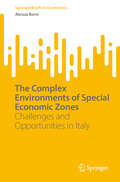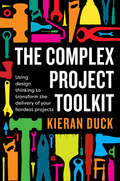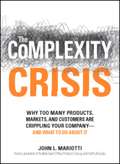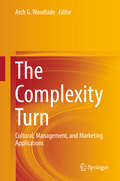- Table View
- List View
The Complete Project Manager: Integrating People, Organizational, and Technical Skills
by Randall Englund MBA, BSEE, NPDP, CBM Alfonso Bucero CSE, MSc, PMPThe Complete Project Manager: Integrating People, Organizational, and Technical Skills is the practical guide that addresses the “soft” project management skills that are so essential to successful project, program, and portfolio management. Through a storytelling approach, the authors explain the necessary skills—and how to use them—to create an environment that supports project success. They demonstrate both the “why” and the “how” of creatively applying soft project management skills in the areas of leadership, conflict resolution, negotiations, change management, and more. This guide has an accompanying workbook, The Complete Project Manager's Toolkit , sold separately.
The Complete Restaurant Management Guide
by Robert T. Gordon Mark H. BrezinskiTwo highly successful veterans in the restaurant industry offer surefire tips to lower the risks of failure, avoid the common pitfalls, and make day-to-day operations smooth and profitable. Highlights of this practical handbook ---- menus: samples, special promotions, and charts and instructions to determine price for profit; -- food production: techniques for controlling food production, charts, sample records, and avoiding production problems; -- controlling costs: sound purchasing policies an good storage and handling practices; -- health and environmental issues: keeping up with governmental guidelines on environmental regulations and on dealing with food borne illnesses.The authors cover every detail of running a restaurant. Franchising, catering, changes in meat grading, labor management, cocktail lounge operations, computerized techniques in accounting, bookkeeping, and seating and much more are all covered at length. Restaurant owners and managers will surely find The Complete Restaurant Management Guide invaluable.
The Complete Social Media Community Manager's Guide: Essential Tools and Tactics for Business Success
by Lauren Litwinka Marty WeintraubA unique approach to today's hottest new job in social media Today's social community managers use social media platforms and act as brand evangelists and community advocates. From creating viral content to crisis communication to leveraging community content, social managers manage online social communities and deal with what comes. Luckily, The Complete Social Media Community Manager's Guide: Essential Tools and Tactics for Business Success is the perfect resource for how to do this increasingly high-profile and crucial job. The book features proven tactics and techniques for effective management and includes more than 40 field-tested tools and templates. If you're a social community manager, learn how to grow a community and achieve the results you need. Topics include a detailed guide to today's social media platforms, how to organize and successfully share content, using metrics and reporting, and more. Helps social media community managers develop, cultivate, and convert their social media communities Does a deep dive into today's crucial social media platforms Provides a complete toolkit of over 40 field-tested tools and templates on everything from how to craft a plan to developing an editorial calendar, tracking results, and more Explains how you can organize and successfully share content among your target community and how to leverage that content to further amplify your message The Complete Social Media Community Manager's Guide: Essential Tools and Tactics for Business Success is a must-have resource for one of the hottest new careers in today's social world.
The Complete Sun Tzu for Business Success
by Gerald A. Michaelson Steven MichaelsonBusiness today is war. As you and your company fight your way back from the recession, you need to take the high ground and make a stand. You need to know how to recapture customers, boost your profit margins, rally your workforce, and identify the competition's weakness to gain an advantage. More than twenty-five centuries ago, the brilliant Chinese military theorist Sun Tzu explained how to accomplish these things. True, he was talking about warfare. But as you'll see in this comprehensive survey, his strategies apply equally well to today's business scene. With the help of Gerald and Steven Michaelson, two of the greatest experts in applying Sun Tzu to today's business climate, you'll learn how to use ancient wisdom to manage your workforce, execute your policies, and find success in both business and your personal life. Use this book to map a battle plan for victory!
The Complete Sun Tzu for Business Success
by Gerald A. Michaelson Steven MichaelsonBusiness today is war. As you and your company fight your way back from the recession, you need to take the high ground and make a stand. You need to know how to recapture customers, boost your profit margins, rally your workforce, and identify the competition's weakness to gain an advantage. More than twenty-five centuries ago, the brilliant Chinese military theorist Sun Tzu explained how to accomplish these things. True, he was talking about warfare. But as you'll see in this comprehensive survey, his strategies apply equally well to today's business scene. With the help of Gerald and Steven Michaelson, two of the greatest experts in applying Sun Tzu to today's business climate, you'll learn how to use ancient wisdom to manage your workforce, execute your policies, and find success in both business and your personal life. Use this book to map a battle plan for victory!
The Complete Sun Tzu for Business Success: Use the Classic Rules of The Art of War to Win the Battle for Customers and Conquer the Competition
by Gerald A MichaelsonBusiness today is war. As you and your company fight your way back from the recession, you need to take the high ground and make a stand. You need to know how to recapture customers, boost your profit margins, rally your workforce, and identify the competition's weakness to gain an advantage.More than twenty-five centuries ago, the brilliant Chinese military theorist Sun Tzu explained how to accomplish these things. True, he was talking about warfare. But as you'll see in this comprehensive survey, his strategies apply equally well to today's business scene.With the help of Gerald and Steven Michaelson, two of the greatest experts in applying Sun Tzu to today's business climate, you'll learn how to use ancient wisdom to manage your workforce, execute your policies, and find success in both business and your personal life.Use this book to map a battle plan for victory!
The Complete Trading Course
by Corey RosenbloomA practical guide covering everything the serious trader needs to knowWhile a variety of approaches can be used to analyze financial market behavior and identify potential trading/investing opportunities, no approach is completely accurate. The challenge for traders is to find a method that they feel comfortable with and are able to implement consistently, through the normal ups and downs of trading.The Trading Course provides you with a detailed description of the methods used to analyze markets, spot profitable trading opportunities, and properly execute trades. Page by page, this book references different trading methodologies, but focuses specifically on applying them when attempting to identify good trades.Discusses the principles of price behavior, trends, trade set ups, trade execution, and intermarket relationshipsDetails different trading tools and techniques, including Japanese Candlesticks, Elliott Wave, Dow Theory, momentum indicators, and much moreIf you want to become a successful trader, you have to be prepared. This book will show you what it takes to make it in this field and how you can excel without getting overwhelmed.
The Complete Trading System: How to Develop a Mindset, Maximize Profitability, and Own Your Market Success
by Casey StubbsRaise your trading game by incorporating lessons from outside the financial markets In The Complete Trading System: How to Develop a Mindset, Maximize Profitability, and Own Your Market Success, veteran trading strategist Casey Stubbs delivers a comprehensive and holistic guide to making money in the financial markets. In the book, the author presents an insightful framework for focusing your entire lifestyle on the art of trading and for harmonizing the different components of your trading strategy. You’ll learn to set the foundations for successful trading and develop your mindset into one that’s capable of dominating the markets. You’ll also discover: A deep understanding of how markets move and what that says about what’s going on behind the scenes Leverage momentum to find accurate and powerful entries and exploit market flow and key levels to get an edge on bank traders Use candlestick and chart patterns to obtain confirmation and improve confidence in your tradesAn essential resource for market participants and day traders, The Complete Trading System is a singular and incisive roadmap to improving your risk-adjusted returns in the financial markets.
The Complete TurtleTrader: The Legend, the Lessons, the Results
by Michael W. CovelThis is the true story behind Wall Street legend Richard Dennis, his disciples, the Turtles, and the trading techniques that made them millionaires. What happens when ordinary people are taught a system to make extraordinary money? Richard Dennis made a fortune on Wall Street by investing according to a few simple rules. Convinced that great trading was a skill that could be taught to anyone, he made a bet with his partner and ran a classified ad in the Wall Street Journal looking for novices to train. His recruits, later known as the Turtles, had anything but traditional Wall Street backgrounds; they included a professional blackjack player, a pianist, and a fantasy game designer. For two weeks, Dennis taught them his investment rules and philosophy, and set them loose to start trading, each with a million dollars of his money. By the time the experiment ended, Dennis had made a hundred million dollars from his Turtles and created one killer Wall Street legend. In The Complete TurtleTrader, Michael W. Covel, bestselling author of Trend Following and managing editor of TurtleTrader.com, the leading website on the Turtles, tells their riveting story with the first ever on the record interviews with individual Turtles. He describes how Dennis interviewed and selected his students, details their education and experiences while working for him, and breaks down the Turtle system and rules in full. He reveals how they made astounding fortunes, and follows their lives from the original experiment to the present day. Some have grown even wealthier than ever, and include some of today's top hedge fund managers. Equally important are those who passed along their approach to a second generation of Turtles, proving that the Turtles' system truly is reproducible, and that anyone with the discipline and the desire to succeed can do as well as-or even better than-Wall Street's top hedge fund wizards. In an era full of slapdash investing advice and promises of hot stock tips for "the next big thing," as popularized by pundits like Jim Cramer of Mad Money, the easy-to-follow objective rules of the TurtleTrader stand out as a sound guide for truly making the most out of your money. These rules worked-and still work today-for the Turtles, and any other investor with the desire and commitment to learn from one of the greatest investing stories of all time.
The Complete University Guide: In association with UCAS
by Bernard Kingston Nicola ChaltonYour guide to loans, bursaries, grants, tuition fees and preparing your own budget.Find out exactly how much university will cost you and how you can fund your studies. Understand how tuition fees differ within England, Scotland, Wales and Northern Ireland. Get a realistic picture of all your likely outgoings - accommodation, food, travel, study costs, insurance and socialising - and work out a budget you can keep to. Take advantage of the latest information on student loans, grants, bursaries, scholarships, employer sponsorship and other ways to boost your funds.• A unique list of bursaries and scholarships• Valuable survival tips and first-hand accounts from students• Practical advice on gap year, vacation and part-time term work
The Complete Vision Board Kit: Using the Power of Intention and Visualization to Achieve Your Dreams
by John AssarafA vision board is a powerful tool that anyone can use to shape an ideal future through the power of intention and visualization. Learning how to vividly imagine your desired results--attracting your perfect soul mate, radiant health, abundant career opportunities, or building personal and community relationships to give back--is the first step on the path to making them happen. Break through unconscious, limiting beliefs and get ready to transform your future now. If you can envision it, you're halfway there! This book will explain and walk you through exactly how to create a vision board in conjunction with how to retrain your brain to actually start believing that you can achieve all your goals and dreams. Then, the universe will work its magic! This is a great personal gift and one your friends and family will love.
The Complete Will Kit (3rd edition)
by F. Bruce Gentry Jens C. Appel IIIA good overview on the subject of wills and estate planning. Includes some information on regulations and resources by state.
The Complete Works of Rosa Luxemburg, Volume III: Political Writings 1: On Revolution-1897-1905
by Rosa Luxemburg Peter HudisRosa Luxemburg's theoretical masterpieceThis collection is the first of three volumes of the Complete Works devoted to the central theme of Rosa Luxemburg’s life and work—revolution. Spanning the years 1897 to the end of 1905, they contain speeches, articles, and essays on the strikes, protests, and political debates that culminated in the 1905 Russian Revolution—one of the most important social upheavals of modern times. Luxemburg’s near-daily articles and reports during 1905 on the ongoing revolution (which comprises the bulk of this volume) shed new light on such issues as the relation of spontaneity and organization, the role of national minorities in social revolution, and the inseparability ofthe struggle for socialism from revolutionary democracy. We become witness to Luxemburg’s effort to respond to the impulses, challenges, and ideas arising from a living revolutionary process, which in turn becomes the source of much of her subsequent political theory—such as her writings on the mass strike, her strident internationalism, and her insistence that revolutionary struggle never take its eyes off of the need to transform the human personality.Virtually all of these writings appear in English for the first time (translated from both German and Polish) and many have only recently been identified as having been written by Luxemburg.
The CompleteLandlord.com Ultimate Landlord Handbook
by William A. LedererThis book covers the entire cycle of becoming a successful landlord. Written in an accessible format by the entire team of completelandlord.com, this book provides valuable information for landlords from a staff of real estate experts. Readers will find essential information on: What a new landlord can expect How to determine which is the best property to invest in How to keep accurate records, rental agreements and leases How to deal with tenants How to screen tenants How to market your property to tenants How to manage the day-to-day responsibilities of a landlord
The CompleteLandlord.com Ultimate Property Management Handbook
by William A. LedererThis book covers the entire cycle of becoming a successful real estate property manager. Written in an accessible format , this book provides valuable information for investors who are now landlords and property managers. This book is not about the day-to-day of landlording, rather it focuses on the strategies for managing the assets of your property. Readers will find information on: ? The benefits of managing property ? Assembling your core team (attorneys, accountants and insurers) ? Legal documents ? And office help (including the right systems and software, how and when to maintain and repair, and the finances of managing your properties)
The CompleteLandlord.com Ultimate Real Estate Investing Handbook
by William A. LedererThis book covers the entire cycle of becoming a successful real estate investor--providing detailed information on the Why's and, more importantly, the How's.Written in an accessible format, this book provides valuable information for first time real estate investors. Readers will find information on: Becoming a property investor, winning residential investment strategies; assembling your team; from offer to closing; how to work on fixer uppers; owning properties as a long term investment; flipping your property and all the business details necessary to invest.
The Completely Revised Handbook of Coaching
by Pamela McleanWhen the first edition of The Handbook of Coaching was published in 1999 it was an innovative resource that offered a compendium of basic information about the then burgeoning field of adult coaching. Written for experienced and aspiring coaches, as well as for executives and human resource professionals interested in this expansive profession, this thoroughly revised and updated edition describes the essential underpinnings of successful coaching and includes a comprehensive, annotated list of books, articles, and other resources. The second edition also contains chapters that focus on how coaches can facilitate transformative change and explores how transitions create opportunity for development. This new edition also incorporates new advances in and research on coaching and adult development-pulling together data that is available online and new information that cannot be found anywhere else.
The Completely Revised and Updated Fast-Food Guide
by Michael F. Jacobson Sarah FritschnerCompletely revised and updated, this guide is a must for people who care about their kids, their waistlines, and their arteries.
The Complex Anatomy of Drug R&D
by Gary P. PisanoIn order to appreciate the revolutionary changes taking place in the drug sciences, as well as understand the fundamental management and economic challenges of companies in the drug business, we need to understand the drug R&D process and its unique characteristics. These characteristics create unique business challenges and explain why strategies and approaches can not be borrowed wholesale from other contexts. This chapter is excerpted from "Science Business: The Promise, the Reality, and the Future of Biotech."
The Complex Environments of Special Economic Zones: Challenges and Opportunities in Italy (SpringerBriefs in Economics)
by Alessia BerniThis book presents a comprehensive framework for understanding Special Economic Zones (SEZs) as a powerful tool for regional development, stimulating investment, creating employment opportunities, and supporting economic growth through tax incentives and other benefits. It explores the relationships between academic institutions, industry, policymakers, and institutional actors, and highlights how collaborations between public and private sectors drive economic growth. The book further provides insights into how these zones foster innovation, attract foreign investment, and promote regional advancement through an in-depth analysis of SEZ types such as export processing zones, free trade zones, and high-tech parks. Drawing on global case studies, the book identifies key governance structures and labor policies that enhance SEZ performance. It also examines how strategic interventions can address labor market challenges, especially in developing countries. The book will appeal to scholars, policymakers, and stakeholders seeking to understand the role of SEZs in economic and employment growth worldwide.
The Complex Project Toolkit: Using design thinking to transform the delivery of your hardest projects
by Kieran DuckThe essential guide for project managers and leaders.Project managers are often responsible for big teams and millions (sometimes billions) of dollars to deliver successful outcomes on time and within budget. But the reality is, most complex projects don't live up to their promise - they often fail, under-deliver or get delivered but burn out everyone in the process. Author and experienced project manager, Kieran Duck, argues that this is because the normal approach to project management doesn't work when projects are complex. The traditional emphasis on certainty and predictability comes from an industrial era where the focus was on controlling resources and effort. These days projects are unpredictable, they are emergent and performance relies on the opinions of key stakeholders and team members.The Complex Project Toolkit provides a way through this. Based on the concepts of design thinking, this comprehensive toolkit adds to existing project management approaches with new mindsets, practices and skills that will lift the performance of your most ambitious projects and improve the experience for everyone involved.
The Complexity Crisis
by John L MariottiMany companies today are in crisis. In the quest to grow their business in flat or declining markets, they have created dozens of new products and services while increasing their customer, vendor, and marketplace relationships. But even as top-line revenues go up, this rising tide of complexity is drowning bottom-line profits. The Complexity Crisis shows you how to streamline your business for greatest efficiency, effectiveness, and profitability. You'll learn how to: Target complexity in your organization and reduce or eliminate it; Build a simple, effective corporate structure; Add value to your business by avoiding complexity traps. In The Complexity Crisis, management consultant John L. Mariotti shows you how to evaluate your cost and management systems so you can clear away complexity--and conquer your competition.
The Complexity Crisis
by John L. MariottiThe Complexity Crisis shows you how to streamline your business for greatest efficiency, effectiveness, and profitability.
The Complexity Crisis: Why too many products, markets, and customers are crippling your company--and what to do about it
by John L MariottiA Simon & Schuster eBook. Simon & Schuster has a great book for every reader.
The Complexity Turn: Cultural, Management, and Marketing Applications
by Arch G. WoodsideThis book takes the reader beyond net effects and main and interaction effects thinking and methods. Complexity theory includes the tenet that recipes are more important than ingredients—any one antecedent (X) condition is insufficient for a consistent outcome (Y) (e.g., success or failure) even though the presence of certain antecedents may be necessary. A second tenet: modeling contrarian cases is useful because a high or low score for any given antecedent condition (X) associates with a high Y, low Y, and is irrelevant for high/low Y in some recipes in the same data set. Third tenet: equifinality happens—several recipes indicate high/low outcomes.
